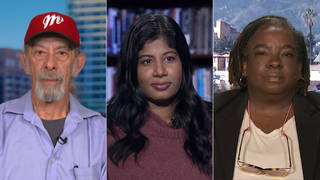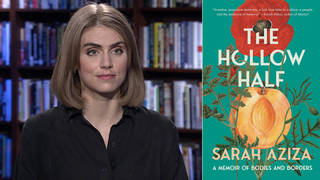
Dozens of mortar shells were fired throughout the capital, two hit the U.S. Embassy. Secretary General Kofi Annan called for immediate deployment of peacekeeping troops. We talk to Salih Booker of Africa Action.
At least 600 civilians have been killed in intense fighting in the Liberian capital of Monrovia in recent days according to the country’s defense minister. Dozens of mortar shells were fired yesterday into the port city. At least two shells hit the U.S. embassy compound.
Calls for the U.S. to send in peacekeeping troops intensified. President Bush said he was watching the situation. To date the U.S. military has deployed 41 Marines to boost security at the embassy. And 4,500 US troops have been moved into the Mediterranean Sea but it would take them a week to sail to Liberia if needed.
To protest Washington’s indifference, Liberians laid the bodies of deceased loved ones outside the U.S. embassy yesterday.
Analysts say the U.S. may have lost its best chance to oversee a peaceful transition from President Charles Taylor to a new democratic government because now troops will be entering a combat situation instead of a cease fire.
UN Secretary General Kofi Annan called for the immediate deployment of U.S. and international troops. The Economic Community of West African States has pledged to send in 1,5000 peacekeeping troops.
- Rep. Charles Rangel (D-NY)
- Salih Booker, Director of Africa Action.
TRANSCRIPT:
AMY GOODMAN: As we move first to deal with the issue of Liberia. We go now to Salih Booker, who is Director of Africa Action. At least 600 civilians have been killed this weekend in Liberia. A shell hit the U.S. compound where it looks like between 10 and 20,000 Liberians have taken refuge, killing more than a dozen Liberians. Their bodies put outside the embassy compound by Liberians to show the world what is taking place. Sally Booker, what do you think needs to happen? What should happen right now? Before we to go Salih Booker, we’ll go to Congressman Charles Rangel. I just spoke to him a few minutes ago about the situation and what he was calling for.
CHARLES RANGEL: Well, we should intervene through the international community; it should not be a unilateral decision. We should get support from the African countries. But I think that humane reasons dictate that we stop the violence, we bring food and medicine and restore our role as really a defender of democracy rather than one that liberates through bombing.
AMY GOODMAN: So you think troops should be sent in? Is there a discussion to get George Bush to do this?
CHARLES RANGEL: Not unilaterally. I want to make it abundantly clear that I think all United States intervention, internationally, should be done by the United Nations.
AMY GOODMAN: That’s New York Democratic congress member, Charles Rangel. Salih Booker on the line, Director of Africa Action. Your response? What should be done right now?
SALIH BOOKER: Well, the Bush administration has been stalling all along before George Bush made his first official trip to Africa several weeks ago, the White House had met with the National Security Council, the Pentagon, the State Department, to consider the urgent situation in Monrovia at the time, and the requests of the United Nations and West African nations and Liberians themselves, for the United States to play a lead role within a multi-national force to establish peace and stability for the political resolution to be allowed to go forward in Liberia. And at that time, it’s my firm belief that the Bush administration rejected any significant role for the United States. That it doesn’t consider Liberia a serious interest to its own sort of minority rule here in Washington. And they simply decided to stall so that their decision not to be involved in Liberia would not become a major embarrassment during the president’s trip to Africa. So they sent a military assessment team to Monrovia. They really looked mainly at the humanitarian situation, which is in just crisis proportions in terms of health conditions, in terms of the huge number of internally displaced people in Liberia. That mission has never reported back to the White House.
The president went—through his trip, he met with Kofi Annan, shortly after returning from Africa and he’s continued to promise to offer U.S. assistance for security and solution in Liberia. But like his other promises to Africa, whether it’s on AIDS or whether it’s on anything else, these are promises that are broken nearly as soon as they’re made.
AMY GOODMAN: Bush has said he is watching the situation carefully. What do you think it is he is looking for, with tens much thousands of people now concentrated right in his own embassy’s compound?
SALIH BOOKER: Well I think he’s doing very much what his father did in 1990. George Herbert Walker Bush, president at the time, faced a very almost identical situation. There were U.S. warships off the coast of Monrovia, they were evacuating Americans and Europeans and basically they decided to leave Liberians to their own fate. And it was a very violent fate. They wanted the situation to resolve itself without requiring American intervention. And in 1990, that’s exactly what happened. The rebel factions that were fighting in Monrovia captured the head of state Samuel Doe, who had been American puppet for the last decade of the cold war, and they killed him and essentially destroyed the capital. And the U.S. decided well there’s no reason for us to intervene now. I think that’s what George Bush is exactly doing right now, waiting for some violent solution to present itself. Whether it’s the death of Charles Taylor or the triumph of one or the other of these rebel militia factions. But he’s looking for a way out, while simply promising that the U.S. will support the West African effort, which is of course itself also extremely slow in getting its act together.












Media Options